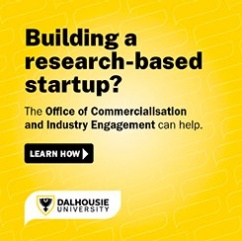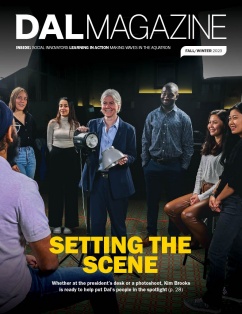Tommy Davies is chief science officer of Foodimprover, a startup that helps companies produce better fruit with the power of gene mapping.
Innovation: Building on unique research from Dalhousie’s Faculty of Agriculture, Foodimprover is set to usher in a new age of gene mapping that will help companies improve the taste, shelf life and resilience of our favourite fruits and berries. Tommy Davies is the genomic cartographer behind the venture. The Dal PhD student says that, while gene editing has revolutionized rice, wheat, and corn, rosaceous crops like apples and strawberries have lagged due to the absence of precise gene editing targets. He says to think of gene editing as a vehicle and the targets as a GPS system. Until now, he says, the GPS system for rosaceous crops has been offline.
Foundation: Davies’ PhD supervisor is Dr. Sean Myles, a leading researcher at Dalhousie’s Faculty of Agriculture with a penchant for entrepreneurship. Davies says Dr. Myles continually pushes students to look at their research from every angle. “He encourages us to think beyond the science, to the greater implications of our discoveries and their business and policy implications,” he says. The push obviously worked. Better than giving him an “A,” Dr. Myles has signed on as Davies’ co-founder in Foodimprover. To get started, the pair turned to Dal’s Office of Commercialization and Industry Engagement. “OCIE was a great early resource for us. They had plenty of wisdom and examples to share that helped us position ourselves early on,” says Davies. They also took Dal’s Lab2Market Launch program where Davies says they put in the hard work to validate their business idea. “They emphasize the importance of doing the thing that no one wants to do—cold calling industry contacts,” he says. But it paid off. “Those conversations are where we formulated our market intelligence and our understanding of where we could potentially capture value.”
Inspiration: There is nothing like a blank page to motivate creative thinking. In the case of Dr. Myles’ lab, it took the form of a whiteboard chart that prompted students to pitch their ideas for the most valuable crops for the team to explore. With ideas buzzing in their heads the prof and students went for a hike up Nova Scotia’s Cape Split. While treading the path, they stumbled on a conundrum—there’s a lot of gene editing activity, but not a lot of success. Why? Davies says they quickly arrived at a conclusion—they don’t know where to edit. “Wow, it’s so wild that these groups are still pouring all this money into gene editing when they have no targets. And we thought, given our expertise and our resources we can build the maps.”
Why It Matters: Beyond the promise of breaking into a multibillion-dollar industry—they are talking with a range of key players in the sector—Davies says there is a potential for Foodimprover to make significant contributions to strengthening global food security. He says that dramatic shifts in agricultural environments and new pests resulting from climate change will increase the need for rapid development and adaptation of new crops. “We need to be able to accelerate the breeding process or we’re going to run into a real problem,” he says. “So, when something bad comes up, we have the tools to address it, not on the current scale of 30 years, but perhaps on the scale of four, five or six.”
Read more: Where Ideas Meet Impact: In business to build a better apple (Dal News)
This story appeared in the DAL Magazine Fall/Winter 2023 issue. Flip through the rest of the issue using the links below.



